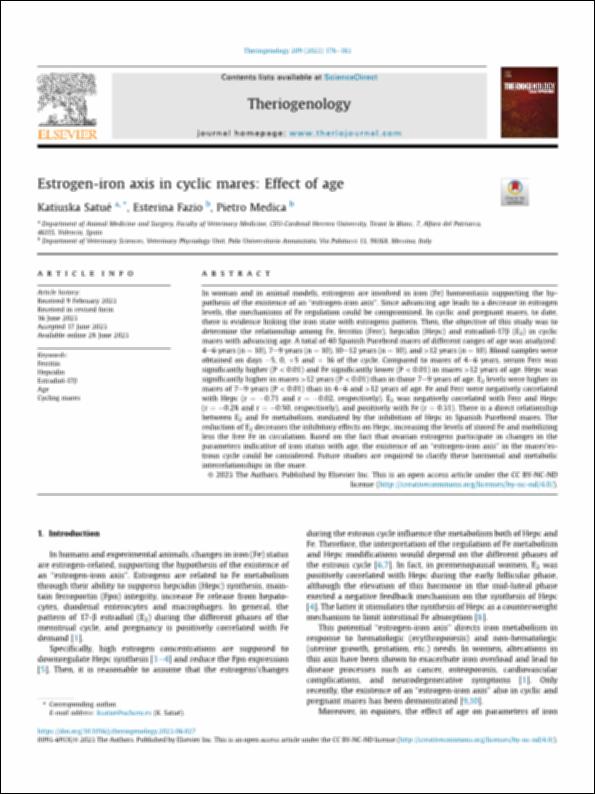Por favor, use este identificador para citar o enlazar este ítem:
http://hdl.handle.net/10637/15899Estrogen-iron axis in cyclic mares: effect of age
| Título : | Estrogen-iron axis in cyclic mares: effect of age |
| Autor : | Satué Ambrojo, Katiuska Fazio, Esterina Medica, Pietro |
| Materias: | Caballos; Horses; Genética animal; Animal genetics; Reproducción animal; Animal reproduction; Estrógenos; Estrogen; Embarazo; Pregnancy; Hierro; Iron; Edad; Age |
| Editorial : | Elsevier |
| Citación : | Satué, K., Fazio, E. & Medica, P. (2023). Estrogen-iron axis in cyclic mares: effect of age. Theriogenology, vol. 209 (oct.), pp. 178–183. DOI: https://doi.org/10.1016/j.theriogenology.2023.06.027 |
| Resumen : | In woman and in animal models, estrogens are involved in iron (Fe) homeostasis supporting the hypothesis of the existence of an “estrogen-iron axis”. Since advancing age leads to a decrease in estrogen levels, the mechanisms of Fe regulation could be compromised. In cyclic and pregnant mares, to date, there is evidence linking the iron state with estrogens pattern. Then, the objective of this study was to determine the relationship among Fe, ferritin (Ferr), hepcidin (Hepc) and estradiol-17β (E2) in cyclic mares with advancing age. A total of 40 Spanish Purebred mares of different ranges of age was analyzed: 4–6 years (n = 10), 7–9 years (n = 10), 10–12 years (n = 10), and >12 years (n = 10). Blood samples were obtained on days −5, 0, +5 and + 16 of the cycle. Compared to mares of 4–6 years, serum Ferr was significantly higher (P < 0.01) and Fe significantly lower (P < 0.01) in mares >12 years of age. Hepc was significantly higher in mares >12 years (P < 0.01) than in those 7–9 years of age. E2 levels were higher in mares of 7–9 years (P < 0.01) than in 4–6 and >12 years of age. Fe and Ferr were negatively correlated with Hepc (r = −0.71 and r = −0.02, respectively). E2 was negatively correlated with Ferr and Hepc (r = −0.28 and r = −0.50, respectively), and positively with Fe (r = 0.31). There is a direct relationship between E2 and Fe metabolism, mediated by the inhibition of Hepc in Spanish Purebred mares. The reduction of E2 decreases the inhibitory effects on Hepc, increasing the levels of stored Fe and mobilizing less the free Fe in circulation. Based on the fact that ovarian estrogens participate in changes in the parameters indicative of iron status with age, the existence of an “estrogen-iron axis” in the mares'estrous cycle could be considered. Future studies are required to clarify these hormonal and metabolic interrelationships in the mare. |
| URI : | http://hdl.handle.net/10637/15899 |
| Derechos: | http://creativecommons.org/licenses/by-nc-nd/4.0/deed.es Open Access |
| ISSN : | 0093-691X 1879-3231 (Electrónico) |
| Cubierto por: | Acuerdo Transformativo – 2023 |
| Fecha de publicación : | oct-2023 |
| Centro : | Universidad Cardenal Herrera-CEU |
| Aparece en las colecciones: | Dpto. Medicina y Cirugía Animal |
Los ítems de DSpace están protegidos por copyright, con todos los derechos reservados, a menos que se indique lo contrario.


